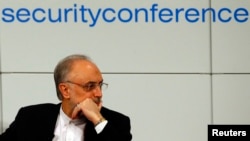Iran says it is open to a U.S. offer for direct talks on its nuclear program and that it expects to resume negotiations with world powers later this month.
Iranian Foreign Minister Ali Akbar Salehi said Sunday that the six world powers - the U.S., China, Russia, Britain, France and Germany - planned to resume talks in Kazakhstan on February 25, calling that "good news."
A spokesman for EU foreign policy chief Catherine Ashton, who coordinates the efforts of the six powers, confirmed that she had proposed talks in Kazakhstan that week. Maja Kocijancic said Sunday it is "good to hear the foreign minister finally confirmed now" and that she hopes Iran's "negotiating team will also confirm."
EU officials have accused Iran of delaying tactics in weeks of discussions over the date and venue for new talks.
Salehi also described as a "step forward" a suggestion the day before by U.S. Vice President Joe Biden that Washington was ready for direct talks with Iran if Tehran was serious about negotiations. He spoke at a panel discussion during an annual international security conference in Munich.
Iran and the so-called P5+1 group held three rounds of talks last year aimed at easing the standoff over its nuclear activities, which Tehran insists are peaceful but the West suspects are intended to give Iran the capacity to build an atomic weapon.
Iranian Foreign Minister Ali Akbar Salehi said Sunday that the six world powers - the U.S., China, Russia, Britain, France and Germany - planned to resume talks in Kazakhstan on February 25, calling that "good news."
A spokesman for EU foreign policy chief Catherine Ashton, who coordinates the efforts of the six powers, confirmed that she had proposed talks in Kazakhstan that week. Maja Kocijancic said Sunday it is "good to hear the foreign minister finally confirmed now" and that she hopes Iran's "negotiating team will also confirm."
EU officials have accused Iran of delaying tactics in weeks of discussions over the date and venue for new talks.
Salehi also described as a "step forward" a suggestion the day before by U.S. Vice President Joe Biden that Washington was ready for direct talks with Iran if Tehran was serious about negotiations. He spoke at a panel discussion during an annual international security conference in Munich.
Iran and the so-called P5+1 group held three rounds of talks last year aimed at easing the standoff over its nuclear activities, which Tehran insists are peaceful but the West suspects are intended to give Iran the capacity to build an atomic weapon.





